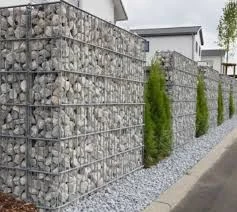-
 Phone:
Phone: -
 Email:
Email:

rock mesh retaining wall
Rock Mesh Retaining Wall A Sustainable Solution for Soil Stability
In civil engineering and construction, retaining walls serve a crucial purpose—they hold back soil and prevent erosion while providing support in various terrains. Among the various types of retaining walls, rock mesh retaining walls have gained significant attention due to their durability, aesthetic appeal, and environmentally friendly characteristics. This article will explore the benefits and applications of rock mesh retaining walls, making a case for their adoption in modern engineering projects.
Understanding Rock Mesh Retaining Walls
A rock mesh retaining wall utilizes high-strength wire mesh combined with natural stones to create a robust structure. The wire mesh is typically made from galvanized steel or stainless steel, providing longevity and resistance to corrosion. The stones filling the mesh can be sourced locally, which not only reduces costs but also minimizes the environmental footprint associated with transportation.
The rock mesh structure allows for the natural drainage of water, which is essential in preventing hydrostatic pressure build-up behind the wall. Unlike traditional concrete retaining walls, rock mesh designs promote filtration and drainage, significantly reducing the risk of failure due to water accumulation.
Benefits of Rock Mesh Retaining Walls
1. Environmental Sustainability Rock mesh retaining walls are a practical choice for environmentally-conscious projects. By utilizing locally-sourced materials, these walls not only blend seamlessly into the landscape but also reduce transport emissions. Additionally, vegetation can grow through the mesh, enhancing biodiversity and improving ecosystem services.
2. Aesthetic Value The natural appearance of rock mesh retaining walls adds a rustic charm to landscapes. They are often employed in parks, gardens, and scenic areas where visual appeal is essential. The aesthetics of natural stone can complement architectural designs, making them desirable for both landscaping and structural purposes.
rock mesh retaining wall

3. Flexibility and Durability The design flexibility of rock mesh retaining walls allows for various configurations to suit specific project needs. They can be constructed in curvilinear shapes, adapting to the topography of the land. The durability of the materials means they can withstand the test of time, resisting weathering and structural degradation.
4. Cost-Effectiveness While the initial investment might seem higher than traditional retaining walls, the long-term benefits of rock mesh walls often outweigh the costs. Their reduced maintenance needs and longevity contribute to overall savings in construction projects. Additionally, their efficient drainage system can help prevent costly repairs caused by water damage.
5. Geotechnical Stability Rock mesh walls provide enhanced stability for slopes and embankments, reducing the risk of landslides and erosion. By allowing vegetation to grow within and around the mesh, these structures can further stabilize the soil through root systems, creating a natural reinforcing mechanism.
Applications of Rock Mesh Retaining Walls
Rock mesh retaining walls are suitable for a variety of applications, including but not limited to
- Highway and Road Construction They are commonly used alongside roads and highways to stabilize slopes and prevent soil erosion, helping maintain the integrity of roadways. - Landscaping Projects In parks and residential areas, these walls can be employed to create aesthetically pleasing terraces, raised garden beds, and boundaries that tie the natural environment with human-made structures. - Water Management In areas prone to flooding or heavy rainfall, rock mesh walls can support drainage systems and alleviate water pressure on slopes.
Conclusion
The rock mesh retaining wall stands as an exemplary model of how modern engineering can harmonize with nature. By offering a sustainable, aesthetically pleasing, and effective solution for soil retention and stability, these walls possess significant advantages over traditional construction methods. As the focus on sustainability continues to rise, rock mesh retaining walls will undoubtedly play a vital role in future landscaping and civil engineering projects, proving that environmentally responsible design can coexist with structural integrity.
-
Wire Mesh for Every Need: A Practical SolutionNewsJul.25,2025
-
Steel Fences: Durable, Secure, and Stylish OptionsNewsJul.25,2025
-
Roll Top Fencing: A Smart Solution for Safety and SecurityNewsJul.25,2025
-
Cattle Farm Fencing Solutions for Maximum SecurityNewsJul.25,2025
-
Affordable Iron Binding Wire SolutionsNewsJul.25,2025
-
Affordable Galvanized Wire SolutionsNewsJul.25,2025
-
Wire Hanger Recycling IdeasNewsJul.25,2025








